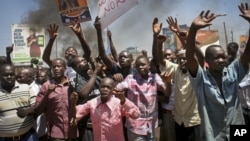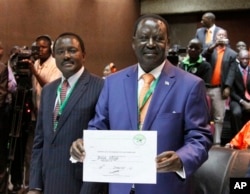NAIROBI —
Kenyan prime minister and presidential candidate Raila Odinga has accused government officials of using their influence to support his rivals. The prime minister's campaign claimed there is a wider scheme to rig Kenya's presidential election on March 4.
Speaking to reporters at a Nairobi airport Thursday, Odinga said the head of civil service, Francis Kimemia, has been working behind the scenes to support his political rivals in the Jubilee Coalition.
“That the current head of public service has basically become an activist of a political party," said Odinga. "He is the one who is recruiting and funding the campaigns of the other side.”
Odinga’s campaign team has accused Kimemia and other government officials of giving instructions to district officers to rally support for Jubilee, commit electoral fraud and to suppress voter turnout in Odinga strongholds.
The prime minister said if Kimemia wants to be involved in politics, he should quit his position.
Uhuru Kenyatta, the Jubilee coalition's presidential candidate, has denied all allegations of vote-rigging.
While it is not clear if the government officials in question have broken any laws, Kennedy Masimbe, the steering committee chairman for the Elections Observation Group in Kenya, told VOA that the officials have “not left doubt” about their political allegiance to Jubilee. He said it is possible they have been using their influence to support the coalition.
“If you have those advantages of incumbency and you are supposed to provide security and logistics around the elections, then there’s that danger that you can be biased in terms of favoring your candidate,” he said.
Masimbe said observers on the ground in Kenya have reported scattered cases of local administrators, from various political parties, trying to influence voters.
“Of course we have captured statements where district officers and district commissioners instruct people to vote in a certain direction,” he said.
He said the incidents are mild compared to the run-up to the disputed presidential election in 2007.
The Kenyan government spokesman's office said on Twitter that the inspector general will lead a joint investigation into the accusations that government officials have been involved in party politics.
Meanwhile, on Wednesday, Kenya’s Chief Justice Willy Mutunga said he had received death threats from a group claiming to be part of a criminal organization historically aligned with Kenyatta’s Kikuyu tribe.
The threats come in the wake of a court case challenging Kenyatta’s eligibility to run for president while he faces charges at the International Criminal Court.
ICC prosecutors accuse him of helping to organize the violence that followed Kenya's last election, in which more than 1,100 people were killed and 600,000 displaced. His trial is due begin in April.
Kenyatta and Odinga are the two leading candidates in this year’s race, and are virtually tied for support according to opinion polls released earlier this week. If neither candidate wins more than 50 percent of the vote on March 4, the election will go to a second round.
Speaking to reporters at a Nairobi airport Thursday, Odinga said the head of civil service, Francis Kimemia, has been working behind the scenes to support his political rivals in the Jubilee Coalition.
“That the current head of public service has basically become an activist of a political party," said Odinga. "He is the one who is recruiting and funding the campaigns of the other side.”
Odinga’s campaign team has accused Kimemia and other government officials of giving instructions to district officers to rally support for Jubilee, commit electoral fraud and to suppress voter turnout in Odinga strongholds.
The prime minister said if Kimemia wants to be involved in politics, he should quit his position.
Uhuru Kenyatta, the Jubilee coalition's presidential candidate, has denied all allegations of vote-rigging.
While it is not clear if the government officials in question have broken any laws, Kennedy Masimbe, the steering committee chairman for the Elections Observation Group in Kenya, told VOA that the officials have “not left doubt” about their political allegiance to Jubilee. He said it is possible they have been using their influence to support the coalition.
“If you have those advantages of incumbency and you are supposed to provide security and logistics around the elections, then there’s that danger that you can be biased in terms of favoring your candidate,” he said.
Masimbe said observers on the ground in Kenya have reported scattered cases of local administrators, from various political parties, trying to influence voters.
“Of course we have captured statements where district officers and district commissioners instruct people to vote in a certain direction,” he said.
He said the incidents are mild compared to the run-up to the disputed presidential election in 2007.
The Kenyan government spokesman's office said on Twitter that the inspector general will lead a joint investigation into the accusations that government officials have been involved in party politics.
Meanwhile, on Wednesday, Kenya’s Chief Justice Willy Mutunga said he had received death threats from a group claiming to be part of a criminal organization historically aligned with Kenyatta’s Kikuyu tribe.
The threats come in the wake of a court case challenging Kenyatta’s eligibility to run for president while he faces charges at the International Criminal Court.
ICC prosecutors accuse him of helping to organize the violence that followed Kenya's last election, in which more than 1,100 people were killed and 600,000 displaced. His trial is due begin in April.
Kenyatta and Odinga are the two leading candidates in this year’s race, and are virtually tied for support according to opinion polls released earlier this week. If neither candidate wins more than 50 percent of the vote on March 4, the election will go to a second round.





